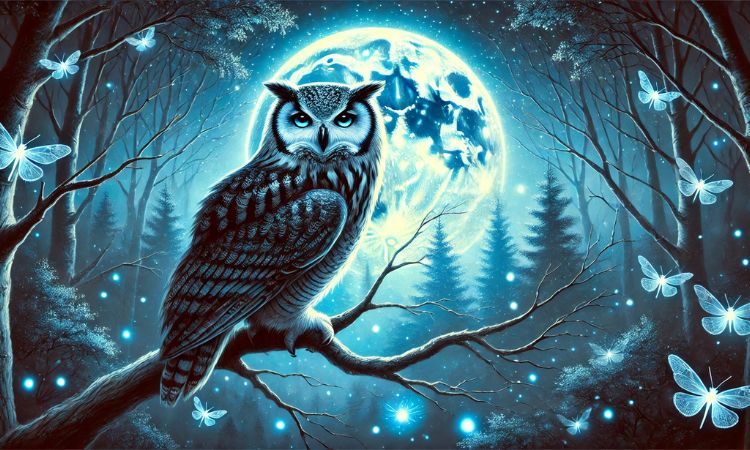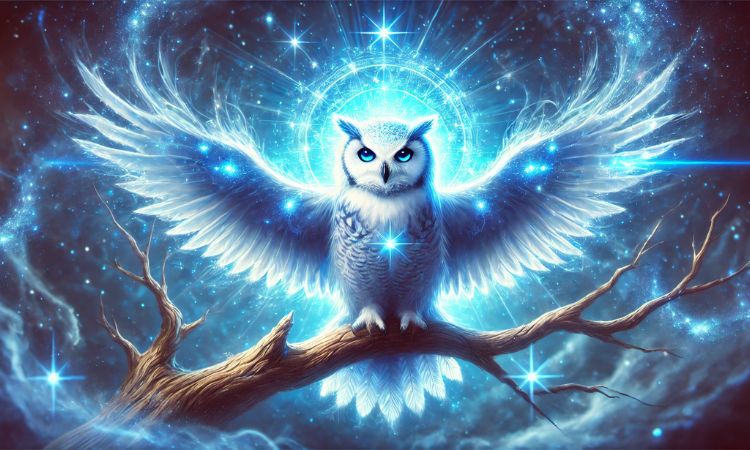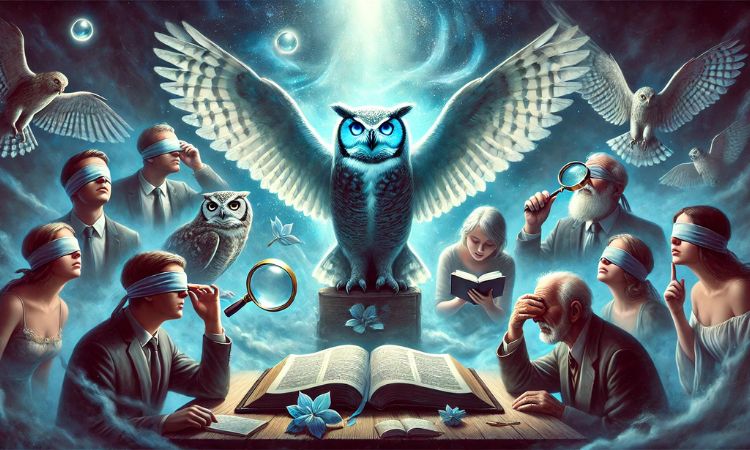Owls have long intrigued us with their mysterious presence and haunting calls. In the Bible, the hoot of an owl holds special significance, often invoking feelings of unease and curiosity. Many people wonder about the deeper meanings behind these nocturnal sounds and how they relate to biblical teachings.
The sound of an owl hooting can stir up feelings of loneliness or even serve as an omen. This can leave us searching for answers about what such a sound might signify in a spiritual or symbolic context.
Interestingly, in biblical texts, owls are often linked to desolation and ruin, painting a vivid picture of their symbolic significance. But what does this truly mean for us today?
I will dive into the biblical meaning of an owl hooting, exploring the interpretations and symbolism behind this captivating creature’s calls. Let’s unravel the mystery together and uncover the spiritual insights it offers.

What Does Owl Hooting Mean in the Bible?
In the Bible, the sound of an owl hooting often carries deep symbolic meanings, reflecting themes of desolation, judgment, and spiritual insight. Owls are frequently depicted in biblical texts as inhabitants of desolate places, symbolizing solitude and abandonment. For example, in Isaiah 34:11 and Psalm 102:6, owls are mentioned to convey a sense of utter desolation and spiritual emptiness.
Owls hooting can signify a warning of impending judgment. This interpretation stems from the owl’s association with desolate and ruined places, which often symbolize the consequences of divine retribution. In Isaiah 34:13-14, the presence of owls in desolate lands illustrates the aftermath of divine judgment.
Owls are also linked to mourning and sorrow. In Micah 1:8, the prophet likens his lament to the moaning of an owl, highlighting the deep sorrow and grief associated with their calls. This connection underscores the emotional weight carried by the sound of an owl’s hoot, symbolizing times of grief and distress.
Being nocturnal creatures, owls are associated with darkness and spiritual blindness. Their hooting can symbolize the presence of evil or spiritual obscurity, serving as a reminder of the need for spiritual vigilance and purity.
Despite their generally negative connotations, owls also symbolize wisdom and insight due to their ability to see in the dark. This attribute is reminiscent of the spiritual discernment that believers are called to cultivate in their lives.
What Is the Biblical Symbolism of Owl Hooting?
In the Bible, the hooting of an owl is rich with symbolic meanings. It often reflects themes of desolation, judgment, and spiritual insight.

Desolation and Loneliness:
Owls are frequently depicted in desolate places, symbolizing solitude and abandonment. In Isaiah 34:11 and Psalm 102:6, owls symbolize utter desolation and spiritual emptiness, highlighting the loneliness that can accompany spiritual desolation.
Judgment and Warning:
Owl hooting can signify a warning of impending judgment. The association with desolate, ruined places symbolizes the consequences of divine retribution. Isaiah 34:13-14 uses the presence of owls in desolate lands to illustrate divine judgment, making the owl’s call a cautionary message urging repentance.
Mourning and Sorrow:
Owls are often linked to mourning and sorrow. In Micah 1:8, the prophet’s lament is likened to the moaning of an owl, emphasizing the deep sorrow and grief symbolized by an owl’s hoot.
Spiritual Blindness and Wickedness:
Being nocturnal, owls are associated with darkness and spiritual blindness. Their hooting symbolizes the presence of evil or spiritual obscurity, reminding believers of the need for spiritual vigilance and purity.
Wisdom and Insight:
Despite generally negative connotations, owls symbolize wisdom and insight due to their ability to see in the dark. Proverbs 30:17 highlights the owl’s sharp vision, symbolizing the ability to discern truth and make wise decisions.
Unclean Birds:
Owls are classified as unclean birds in Leviticus 11:13-18 and Deuteronomy 14:11-17, forbidden for consumption. This classification emphasizes their symbolic role in representing spiritual impurity and the need for cleansing.
Each of these interpretations offers a different perspective on the biblical symbolism of owl hooting, providing profound insights into themes of desolation, judgment, mourning, spiritual blindness, wisdom, and impurity.
What Are the Negative Associations of Owls in the Bible?
Owls in the Bible are predominantly associated with negative symbolism, reflecting themes of desolation, judgment, and spiritual impurity.
Desolation and Loneliness: Owls are often depicted as inhabitants of desolate and abandoned places. This imagery is used to symbolize utter desolation and profound loneliness. In Isaiah 34:11 and Psalm 102:6, owls are described as dwelling in ruins, representing a state of abandonment and emptiness.
Judgment and Divine Retribution: The presence of owls in certain biblical passages signifies impending judgment and divine retribution. In Isaiah 34:13-15 and Jeremiah 50:39, owls are mentioned as inhabitants of lands laid waste by God’s judgment. Their presence in these desolate areas underscores the severity of divine punishment and the consequences of turning away from God.
Mourning and Sorrow: Owls are linked to mourning and sorrow. In Micah 1:8, the prophet compares his lament to the moaning of an owl, highlighting the deep grief and sorrow associated with their calls. This connection underscores the emotional weight carried by the sound of an owl’s hoot, symbolizing times of grief and distress.
Spiritual Blindness and Wickedness: As nocturnal creatures, owls are associated with darkness and spiritual blindness. Their hooting can symbolize the presence of evil or spiritual obscurity, serving as a reminder of the need for spiritual vigilance and purity. This aspect of their symbolism calls believers to seek spiritual illumination and avoid the pitfalls of spiritual darkness.
Unclean Birds: Owls are classified as unclean birds in Leviticus 11:13-18 and Deuteronomy 14:11-17, forbidden for consumption. This classification emphasizes their symbolic role in representing spiritual impurity and the need for cleansing. The unclean status of owls highlights the importance of maintaining spiritual purity and adhering to God’s laws.
These negative associations of owls in biblical texts serve as powerful reminders of the themes of desolation, judgment, mourning, spiritual blindness, and impurity. The symbolic significance of owls in the Bible provides profound insights into the spiritual lessons and warnings conveyed through these creatures.
What Are the Positive Interpretation of Owls in the Bible?
While the Bible often associates owls with negative symbolism like desolation, judgment, and spiritual darkness, there are interpretations that offer a more positive perspective.
Wisdom and Insight: Despite their generally negative connotations, owls symbolize wisdom and insight due to their ability to see in the dark. This attribute is reminiscent of the spiritual discernment that believers are called to cultivate in their lives. Owls’ keen vision in the dark can symbolize the ability to see through deception and gain deeper understanding, which is a valuable trait in spiritual growth.
Spiritual Vigilance: Owls’ nocturnal nature and their ability to thrive in darkness can be seen as a metaphor for spiritual vigilance. Just as owls are alert and active at night, believers are encouraged to be spiritually vigilant and discerning, especially in times of moral and spiritual darkness. This interpretation emphasizes the importance of being watchful and prepared in one’s faith journey.
Symbol of Solitude and Contemplation: In some interpretations, the owl’s solitary nature is seen as a symbol of the soul’s need for quiet contemplation and retreat from worldly distractions. This aligns with the idea of seeking solitude to connect more deeply with God and to reflect on one’s spiritual path. The owl, in this sense, can represent the value of introspection and the pursuit of inner wisdom.
Transformation and New Beginnings: While not explicitly stated in the Bible, some broader cultural interpretations of owls can be applied to a biblical context. For example, the owl’s association with transformation and new beginnings can be seen as a metaphor for spiritual rebirth and renewal. This perspective highlights the potential for personal and spiritual growth through introspection and the pursuit of wisdom.
These positive interpretations offer a nuanced understanding of owls in biblical symbolism, suggesting that while they often represent negative themes, they can also signify valuable spiritual qualities like wisdom, vigilance, contemplation, and transformation.
What Is the Spiritual Significance of Owl in Different Cultures?
The spiritual significance of owls varies widely across different cultures, reflecting a diverse range of beliefs and interpretations.

Native American Cultures: In Native American traditions, owls are often seen as messengers from the spirit world. Many tribes, such as the Apache and Cree, believe owls are connected to death and the afterlife. For instance, the Apache views dreaming of an owl as a sign of approaching death, while the Cree sees the Boreal Owl’s whistle as a summons from spirits. Despite these associations with death, owls are also revered for their wisdom and protective qualities. The Dakota Hidatsa consider the Burrowing Owl a protective spirit for warriors, and the Hopi regard it as a god of the dead and a guardian of underground things.
Japanese and Chinese Cultures: In Japan and China, owls are symbols of good fortune and protection. They are believed to banish negative energies and bring about abundance when placed in homes as objects or paintings. This connection to feng shui highlights their role in promoting mental, physical, and emotional well-being.
Ancient Egypt, Greece, and Rome: In ancient civilizations like Egypt, Greece, and Rome, owls were seen as symbols of wisdom and protection. In Egypt, they were regarded as gatekeepers of the underworld, protecting souls. In Greece and Rome, the owl was associated with the goddesses Athena and Diana, representing wisdom, courage, and higher assistance. The owl was particularly revered in Athens, the city named after Athena, where it symbolized the soul and intellectual prowess.
Indian Folklore: In early Indian folklore, owls represent wisdom, helpfulness, and prophecy. They are seen as creatures with the power to foresee and provide guidance. This theme of wisdom and prophetic abilities recurs in various cultural myths and stories, including Aesop’s fables and Greek mythology.
European Middle Ages: During the Middle Ages in Europe, owls were often associated with witchcraft and the unknown. Their nocturnal nature and eerie calls linked them with death and evil omens. However, as superstitions waned, the owl’s symbolism shifted back towards wisdom and knowledge.
Modern Interpretations: In contemporary spiritual contexts, owls symbolize inner wisdom, transformation, and intuitive development. They are seen as guides during challenging times, helping individuals navigate through hardship with patience and understanding. Owls also represent renewal and new beginnings, encouraging hope and optimism.
These different meanings across cultures highlight the owl’s multifaceted spiritual significance, encompassing both protective and ominous qualities, wisdom, and transformation.
How Can Believers Apply the Symbolism of Owl Hooting to Their Spiritual Journey?
To apply the symbolism of owl hooting to your spiritual journey, be mindful of your actions and thoughts, ensuring they align with spiritual principles. Regular self-examination is crucial, periodically assessing your spiritual health and making necessary adjustments to stay on the right path. Develop discernment to differentiate between right and wrong, truth and deception, especially in challenging times.
Find comfort and reassurance in the symbolism of owls. Remember that God’s presence is constant, even in the darkest moments. Trust in God’s plan and find solace in His promises, even when circumstances seem bleak. Lean on the support of fellow believers and the church community for encouragement and strength.
Respond to the call for repentance and reflection. Acknowledge and turn away from sins, seeking forgiveness and striving to live a righteous life. Reflect on your life choices and make necessary changes to align more closely with spiritual values. Embrace the opportunity for spiritual renewal and growth, allowing past mistakes to transform into lessons for the future.
Embrace change and transformation in your spiritual journey. Be open to the changes that God may be bringing into your life, trusting that these changes are for your growth and betterment. Actively seek personal and spiritual growth, understanding that transformation often involves leaving behind old habits and embracing new ways of living. Pursue deeper spiritual enlightenment and understanding, recognizing that transformation is a continuous journey.
By integrating these symbolic meanings into your spiritual life, you can find deeper meaning and guidance through the seemingly simple act of hearing an owl hoot.
What Are Common Misconceptions About the Biblical Meaning of Owl Hooting?

Owls as evil omens:
- Many believe owls, and their hooting, are inherently evil or bring bad luck. In the Bible, owls symbolize the consequences of sin and resulting desolation, not malevolence (Isaiah 34:11; Zephaniah 2:13).
Owls as symbols of death:
- Another misconception is that owls are harbingers of death. This belief stems from cultural superstitions rather than biblical teachings. Owls in the Bible symbolize desolation and abandonment, not death (Jeremiah 50:39; Isaiah 34:8-11).
Owls as unclean and therefore evil:
- Owls are classified as unclean birds in Mosaic Law, meaning they were forbidden for consumption (Leviticus 11:13-18; Deuteronomy 14:11-17). This does not imply they are evil; the unclean status relates to dietary laws and ritual purity, not moral character.
Owls as solely negative symbols:
- While often associated with negative imagery like desolation and judgment, owls also have positive connotations. Their ability to see in the dark can symbolize spiritual discernment and wisdom (Job 12:7-8).
Owls as direct messengers of doom:
- Some believe hearing an owl hoot is a direct message of impending doom. In biblical context, the hooting can symbolize a call to repentance or a warning of judgment, not a literal omen of disaster (Micah 1:8).
Modern cultural interpretations as biblical truths:
- Modern associations depict owls as symbols of wisdom and knowledge, influenced by literature and media. These interpretations are not explicitly supported by biblical texts, which primarily use owl imagery to convey themes of desolation and spiritual blindness (Isaiah 34:11; Psalm 102:6).
Frequently Asked Questions
What Does It Mean if Owls Hang around Your House?
Owls around your house often symbolize wisdom and knowledge, urging you to seek insight and trust your intuition. They can also represent protection and guardianship, indicating spiritual watchfulness over your household.
What Is the Myth About Owl Hooting?
A common myth about owl hooting is that it foretells death. This belief is prevalent in various cultures, such as Ancient Rome and Native American traditions, where the sound is often seen as an ominous sign.
What God Is Represented by an Owl?
In Greek mythology, the owl represents Athena, the goddess of wisdom and warfare. The owl symbolizes her ability to see the truth and provide guidance, embodying wisdom and protection.
Is the Owl a Positive Omen?
In many cultures, the owl is seen as a positive omen. It symbolizes wisdom, protection, and good fortune, particularly in Greek, Roman, Japanese, and Chinese traditions, where it is associated with knowledge and safeguarding.
What Does It Mean When You Hear Owls Hooting at Night?
Hearing owls hoot at night can signify a call to tap into your inner wisdom and intuition. It may also indicate upcoming changes, personal transformation, or a need for self-reflection and introspection
Conclusion
The biblical Interpretation of an owl hooting is rich and multifaceted, drawing on themes of desolation, judgment, and wisdom. Owls often symbolize desolation and loneliness, reflecting the aftermath of divine judgment and the consequences of spiritual abandonment.
However, owls also embody wisdom and insight, reminding us of the importance of spiritual vigilance and discernment. Their nocturnal nature serves as a metaphor for seeing through spiritual darkness and gaining deeper understanding.
Whether seen as harbingers of sorrow or symbols of contemplation and transformation, owls offer profound spiritual lessons. By reflecting on these interpretations, believers can find guidance and inspiration in their spiritual journeys, embracing both the warnings and wisdom that owls symbolize in biblical texts.






